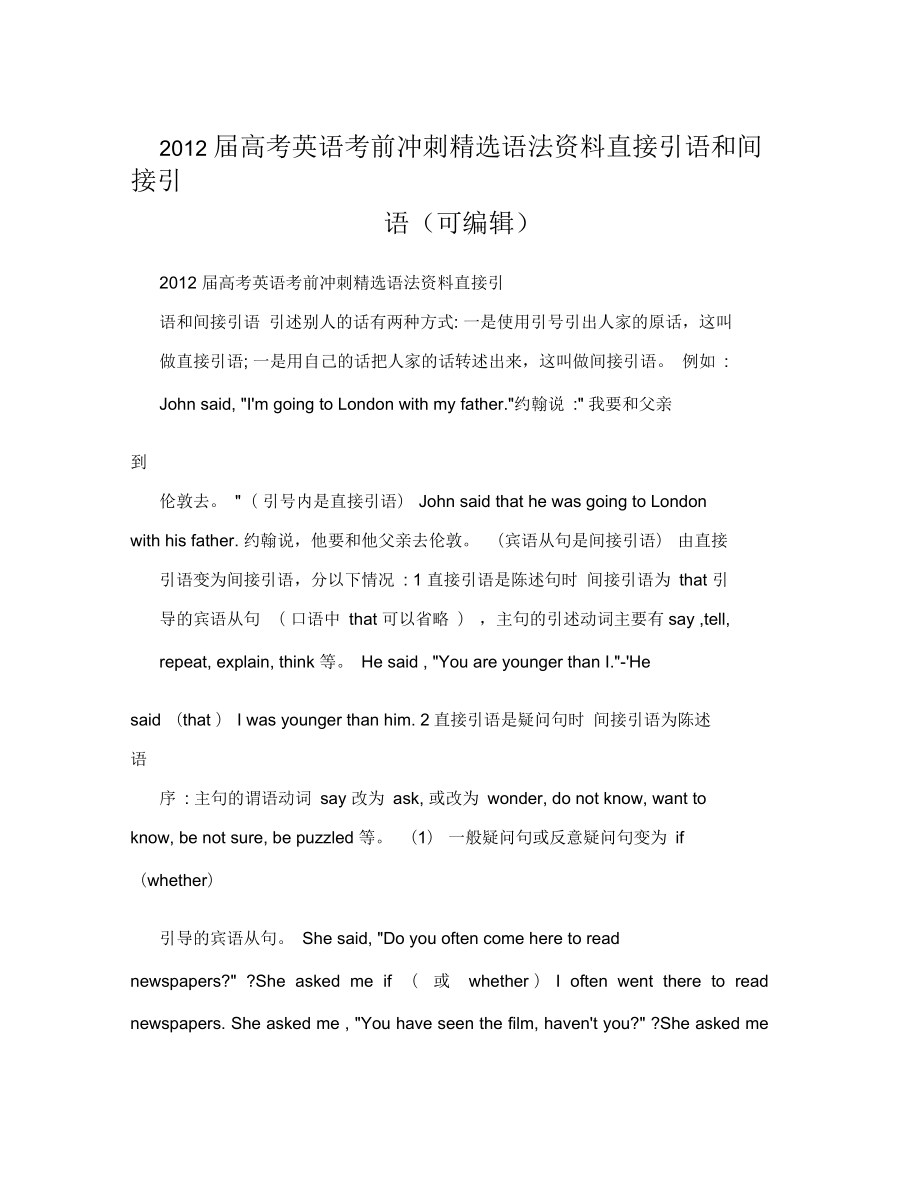 高考英语考前冲刺语法资料直接引语和间接引语
高考英语考前冲刺语法资料直接引语和间接引语



《高考英语考前冲刺语法资料直接引语和间接引语》由会员分享,可在线阅读,更多相关《高考英语考前冲刺语法资料直接引语和间接引语(6页珍藏版)》请在装配图网上搜索。
1、2012 届高考英语考前冲刺精选语法资料直接引语和间接引语(可编辑)2012 届高考英语考前冲刺精选语法资料直接引语和间接引语 引述别人的话有两种方式: 一是使用引号引出人家的原话,这叫做直接引语; 一是用自己的话把人家的话转述出来,这叫做间接引语。 例如 :John said, Im going to London with my father.约翰说 : 我要和父亲到伦敦去。 ( 引号内是直接引语) John said that he was going to Londonwith his father. 约翰说,他要和他父亲去伦敦。 (宾语从句是间接引语) 由直接引语变为间接引语,分以下
2、情况 : 1 直接引语是陈述句时 间接引语为 that 引导的宾语从句 ( 口语中 that 可以省略 ) ,主句的引述动词主要有say ,tell,repeat, explain, think 等。 He said , You are younger than I.-Hesaid (that ) I was younger than him. 2直接引语是疑问句时 间接引语为陈述语序 : 主句的谓语动词 say 改为 ask, 或改为 wonder, do not know, want toknow, be not sure, be puzzled 等。 (1) 一般疑问句或反意疑问句变为
3、if(whether)引导的宾语从句。 She said, Do you often come here to readnewspapers? ?She asked me if ( 或 whether)I often went there to read newspapers. She asked me , You have seen the film, havent you? ?She asked me whether( 或if )I had seen the film. 选择疑问句变为 whether,.or 宾语从句。 I askedhim, Will you stay at home
4、or go to a film tonight? ?I asked him whetherhe would stay at home or go to a film that night.特殊疑问句变为由原来的疑问词引导的宾语从句。 He asked , Where do you live? ?He asked mewhere I lived. 3. 直接引语是祈使句时 间接引语为不定式,作 ask , tell, beg,order, warn, advise 等动词的宾语补足语(dont 变为 not ). The teachersaidto the boy, Open the windo
5、w.?The teacher told the boy to open the window. His father said to him , Dont leave the door open.?His father toldhim not to leave the door open. 注意 (1) 有些表示建议、提议、劝告或要求的祈使句,可以用 suggest ,insist 等动词加以转述。例如 : He said,Lets go to the theatre. ?He suggested (our )going to the theatre.或 He suggested that w
6、e(should) go to the theatre. (2) Would you mindopening the window? he asked. ?He asked me to open the window. Whydont you take a walk after supper? he asked . ?he advised me to take a直接引语是感叹句时 间接引语为 what 或 howwalk after supper. Shall we listen to the music? he asked. ?He suggestedlistening to the mu
7、sic. 4.导,也可以用 that 引导。 She said, What a lovely day it is ! ?She saidwhat a lovely day it was . 或 She said that it was a lovely day. 5( 如果主句谓语动词为各种现在时或一般将来时,则间接引语中的动词仍保持直接引语原来时态。如果主句谓语动词为过去时,间接引语中的动词时态按下列变化(1) 一般现在时变为一般过去时(2) 现在进行时变为过去进行时(3) 一般将来时变为过去将来时(4) 现在完成时变为过去完成时(5) 一般过去时变为过去完成时(6) 过去完成时不变,仍为过
8、去完成时 注意 (1) 如果直接引语是表示客观真理时,变为间接引语,一般现在时不改为一般过去时。如:The teacher said The earth goes round the sun. ?The teacher saidthat the earth goes round the sun. (2)如果直接引语中有明确表示过时间的状语,变为间接引语时,一般过去时不改为过去完成时。如 : He said to me,I was born in 1973. ?He told me that he was born in 1973. (3)如果直接引语所述事实在当时和目前同样生效,变为间接宾语时
9、,一般现在时不改为般过去时。如 : He said, Im a boy, not a girl. ?He said that he isaboy ,not a girl. 如果直接引语中的谓语动词表示一种反复出现或习惯动作,在变为间接引时,一般现在时不改为一般过去时。如 : The girl said, Igetup at six every morning. ?The girl said that she gets up at six every morning. 如果直接引语中含有 since, when, while 引导的表示过去时间的状语从句,在变为间接引语时,只改变主句中的谓语动词
10、,从句的一般过去时则不变。如 : He said to me, I have taught English since he came here . ?He told me that he had taught English since he came here.如果直接引语中含有情态动词 must, need, had better 以及情态动词的过去式could,might,should, would, 在变为间接引语时,这些情态动词没有时态的改变。例如 : Theteacher said to me . You must pay more attention to yourpronun
11、ciation. ?The teacher told me that I must (have to ) pay moreattention to my pronunciation. He said , I could swim when I was only six . ?He saidthat he could swim when he was only six. 6. 代词等一般地应作用相应的变化,变化方法见下表。 指示代词 this,these these,th ose 表示时间的词 now,then today,that day this week(month ,etc),that
12、week(month ,etc) yesterday,the day before last week(month ,etc),the week(month ,etc) before three days (a year ,etc) ago,three days (a year. etc) before tomorrow,the next (following )day next week(month ,etc),the next (following ) week (month ,etc)表地点的词here,there 动词 bring,take come,go直接引语变间接引语面面观一、如
13、何变人称:将直接引语变间接引语时,常常弄不清人称变化。下面有一句顺口溜“一随 主。二随宾,第三人称不更新”。“一随主”是指在直接引语变间接引语时,如果 从句中的主语是第一人称或被第一人称所修饰。从句中的人称要按照主句中主语的 人称变化如:She said. My brother wants to go with me. ?She said her brother wanted to go with her. “二随宾”是指直接引语变间接引语时,若从句中的主 语及宾语是第二人称。或被第二人你所修饰。从句中的人称要跟引号外的主句的宾语致。如果引号外的主句没有宾语。也可以用第一人称,如 :He said to Kate.
- 温馨提示:
1: 本站所有资源如无特殊说明,都需要本地电脑安装OFFICE2007和PDF阅读器。图纸软件为CAD,CAXA,PROE,UG,SolidWorks等.压缩文件请下载最新的WinRAR软件解压。
2: 本站的文档不包含任何第三方提供的附件图纸等,如果需要附件,请联系上传者。文件的所有权益归上传用户所有。
3.本站RAR压缩包中若带图纸,网页内容里面会有图纸预览,若没有图纸预览就没有图纸。
4. 未经权益所有人同意不得将文件中的内容挪作商业或盈利用途。
5. 装配图网仅提供信息存储空间,仅对用户上传内容的表现方式做保护处理,对用户上传分享的文档内容本身不做任何修改或编辑,并不能对任何下载内容负责。
6. 下载文件中如有侵权或不适当内容,请与我们联系,我们立即纠正。
7. 本站不保证下载资源的准确性、安全性和完整性, 同时也不承担用户因使用这些下载资源对自己和他人造成任何形式的伤害或损失。
